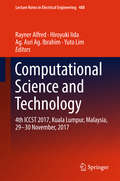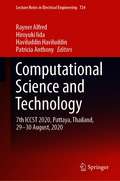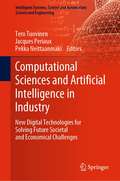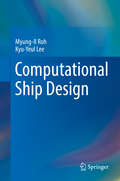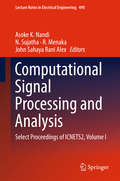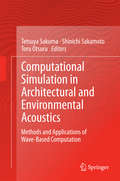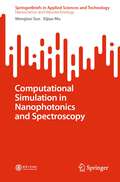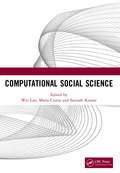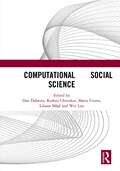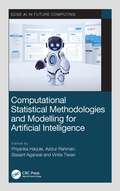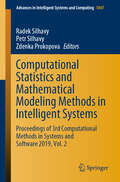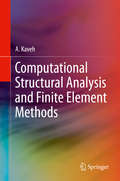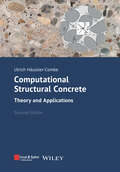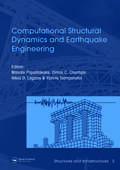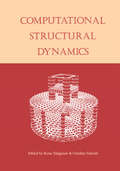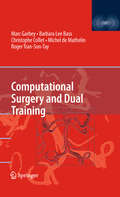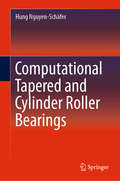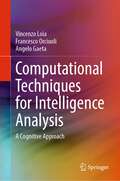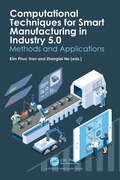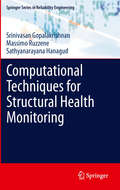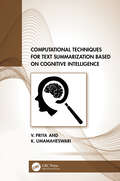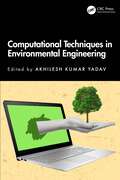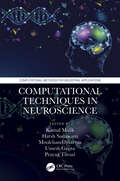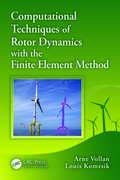- Table View
- List View
Computational Science and Technology: 4th Iccst 2017, Kuala Lumpur, Malaysia, 29-30 November 2017 (Lecture Notes In Electrical Engineering #488)
by Hiroyuki Iida Rayner Alfred Ag. Asri Ag. Ibrahim Yuto LimThis book gathers the proceedings of the Fourth International Conference on Computational Science and Technology 2017 (ICCST2017), held in Kuala Lumpur, Malaysia, on 29–30 November 2017. These proceedings offer practitioners and researchers the opportunity to present exciting advances in computational techniques and solutions in this area. They also identify emerging issues, help to shape future research directions, and will enable industrial users to apply cutting-edge, large-scale and high-performance computational methods.
Computational Science and Technology: 7th ICCST 2020, Pattaya, Thailand, 29–30 August, 2020 (Lecture Notes in Electrical Engineering #724)
by Patricia Anthony Hiroyuki Iida Rayner Alfred Haviluddin HaviluddinThis book gathers the proceedings of the Seventh International Conference on Computational Science and Technology 2020 (ICCST 2020), held in Pattaya, Thailand, on 29–30 August 2020. The respective contributions offer practitioners and researchers a range of new computational techniques and solutions, identify emerging issues, and outline future research directions, while also showing them how to apply the latest large-scale, high-performance computational methods.
Computational Sciences and Artificial Intelligence in Industry: New Digital Technologies for Solving Future Societal and Economical Challenges (Intelligent Systems, Control and Automation: Science and Engineering #76)
by Pekka Neittaanmäki Tero Tuovinen Jacques PeriauxThis book is addressed to young researchers and engineers in the fields of Computational Science and Artificial Intelligence, ranging from innovative computational methods to digital machine learning tools and their coupling used for solving challenging industrial and societal problems.This book provides the latest knowledge from jointly academic and industries experts in Computational Science and Artificial Intelligence fields for exploring possibilities and identifying challenges of applying Computational Sciences and AI methods and tools in industrial and societal sectors.
Computational Ship Design (Springer Series On Naval Architecture, Marine Engineering, Shipbuilding And Shipping Ser. #4)
by Myung-Il Roh Kyu-Yeul LeeThis book offers an introduction to the fundamental principles and systematic methodologies employed in computational approaches to ship design. It takes a detailed approach to the description of the problem definition, related theories, mathematical formulation, algorithm selection, and other core design information. Over eight chapters and appendices the book covers the complete process of ship design, from a detailed description of design theories through to cutting-edge applications. Following an introduction to relevant terminology, the first chapters consider ship design equations and models, freeboard calculations, resistance prediction and power estimation. Subsequent chapters cover topics including propeller deign, engine selection, hull form design, structural design and outfitting. The book concludes with two chapters considering operating design and economic factors including construction costs and fuel consumption. The book reflects first-hand experiences in ship design and R&D activities, and incorporates improvements based on feedback received from many industry experts. Examples provided are based on genuine case studies in the field. The comprehensive description of each design stage presented in this book offers guidelines for academics, researchers, students, and industrial manufactures from diverse fields, including ocean engineering and mechanical engineering. From a commercial point of view the book will be of great value to those involved in designing a new vessel or improving an existing ship.
Computational Signal Processing and Analysis: Select Proceedings Of Icnets2, Volume I (Lecture Notes In Electrical Engineering #490)
by Asoke K. Nandi N. Sujatha R. Menaka John Sahaya Rani AlexThis book comprises a collection of papers by international experts, presented at the International Conference on NextGen Electronic Technologies (ICNETS2-2017). ICNETS2 encompassed six symposia covering all aspects of electronics and communications engineering domains, including relevant nano/micro materials and devices. Featuring the latest research on computational signal processing and analysis, the book is useful to researchers, professionals, and students working in the core areas of electronics and their applications, especially signal processing, embedded systems, and networking.
Computational Simulation in Architectural and Environmental Acoustics: Methods and Applications of Wave-Based Computation
by Tetsuya Sakuma Shinichi Sakamoto Toru OtsuruThis book reviews a variety of methods for wave-based acoustic simulation and recent applications to architectural and environmental acoustic problems. Following an introduction providing an overview of computational simulation of sound environment, the book is in two parts: four chapters on methods and four chapters on applications. The first part explains the fundamentals and advanced techniques for three popular methods, namely, the finite-difference time-domain method, the finite element method, and the boundary element method, as well as alternative time-domain methods. The second part demonstrates various applications to room acoustics simulation, noise propagation simulation, acoustic property simulation for building components, and auralization. This book is a valuable reference that covers the state of the art in computational simulation for architectural and environmental acoustics.
Computational Simulation in Nanophotonics and Spectroscopy (SpringerBriefs in Applied Sciences and Technology)
by Mengtao Sun Xijiao MuNanophotonics and spectroscopy has advanced rapidly in recent years. Experimental research on nanophotonics is very active. In addition to experimental research on the principles and applications of nanophotonics, computational simulation research on its various physical mechanisms and phenomena is equally important. The simulation of the optical properties of molecules or crystals, such as electronic spectra (absorption and emission spectra, etc.) and vibrational spectroscopy has extraordinary guiding significance for experiments. The current computational simulation technology can also explain and analyze the physical mechanisms behind phenomena. However, among the many computational simulation software programs available, the operation methods and application scenarios are different. The barrier for new users to conduct research with computational simulation is high. Even for researchers with some experience, it is not easy to develop a comprehensive understanding of the various software programs, keywords, programming languages and auxiliary programs. This book serves as an introductory book for beginners to get started with the technology, and a handbook for experienced readers to quickly look up for commands and script usage. It is a handy reference for graduate students and researchers engaged in the study of photonics and optics.
Computational Social Science: Proceedings of the 1st International Conference on New Computational Social Science (ICNCSS 2020), September 25-27, 2020, Guangzhou, China
by Wei LuoSelected papers from the International Conference on New Computational Social Science, focusing on the following five aspects: Big data acquisition and analysis, Integration of qualitative research and quantitative research, Sociological Internet experiment research, Application of ABM simulation method in Sociology Research, Research and development of new social computing tools. With the rapid development of information technology, especially sweeping progress in the Internet of things, cloud computing, social networks, social media and big data, social computing, as a data-intensive science, is an emerging field that leverages the capacity to collect and analyze data with an unprecedented breadth, depth and scale. It represents a new computing paradigm and an interdisciplinary field of research and application. A broad comprehension of major topics involved in social computing is important for both scholars and practitioners. This proceedings presents and discusses key concepts and analyzes the state-of-the-art of the field. The conference not only gave insights on social computing, but also affords conduit for future research in the field. Social computing has two distinct trends: One is on the social science issues, such as computational social science, computational sociology, social network analysis, etc; The other is on the use of computational techniques. Finally some new challenges ahead are summarized, including interdisciplinary cooperation and training, big data sharing for scientific data mashups, and privacy protect.
Computational Social Science: Proceedings of the 2nd International Conference on New Computational Social Science (ICNCSS 2021), October 15-17, 2021, Suzhou, Jiangsu, China
by Wei Luo Dan Dobrota Roshan Chitrakar Ciurea Maria Liliana MâţâThe proceedings publish selected papers from the 2nd International Conference on New Computational Social Science, focusing on the following five aspects: Big data acquisition and analysis, Integration of qualitative research and quantitative research, Sociological Internet experiment research, Application of ABM simulation method in Sociology Research, Research and development of new social computing tools. With the rapid development of information technology, especially sweeping progress in the Internet of things, cloud computing, social networks, social media and big data, social computing, as a data-intensive science, is an emerging field that leverages the capacity to collect and analyze data with an unprecedented breadth, depth and scale. It represents a new computing paradigm and an interdisciplinary field of research and application. A broad comprehension of major topics involved in social computing is important for both scholars and practitioners. This proceedings presents and discusses key concepts and analyzes the state-of-the-art of the field. The conference not only gave insights on social computing, but also affords conduit for future research in the field. Social computing has two distinct trends: One is on the social science issues, such as computational social science, computational sociology, social network analysis, etc; the other is on the use of computational techniques. Finally, some new challenges ahead are summarized, including interdisciplinary cooperation and training, big data sharing for scientific data mashups, and privacy protect.
Computational Statistical Methodologies and Modeling for Artificial Intelligence (ISSN)
by Basant Agarwal Azizur Rahman Priyanka Harjule Vinita TiwariThis book covers computational statistics-based approaches for Artificial Intelligence. The aim of this book is to provide comprehensive coverage of the fundamentals through the applications of the different kinds of mathematical modelling and statistical techniques and describing their applications in different Artificial Intelligence systems. The primary users of this book will include researchers, academicians, postgraduate students, and specialists in the areas of data science, mathematical modelling, and Artificial Intelligence. It will also serve as a valuable resource for many others in the fields of electrical, computer, and optical engineering.The key features of this book are: Presents development of several real-world problem applications and experimental research in the field of computational statistics and mathematical modelling for Artificial Intelligence Examines the evolution of fundamental research into industrialized research and the transformation of applied investigation into real-time applications Examines the applications involving analytical and statistical solutions, and provides foundational and advanced concepts for beginners and industry professionals Provides a dynamic perspective to the concept of computational statistics for analysis of data and applications in intelligent systems with an objective of ensuring sustainability issues for ease of different stakeholders in various fields Integrates recent methodologies and challenges by employing mathematical modeling and statistical techniques for Artificial Intelligence
Computational Statistics and Mathematical Modeling Methods in Intelligent Systems: Proceedings of 3rd Computational Methods in Systems and Software 2019, Vol. 2 (Advances in Intelligent Systems and Computing #1047)
by Radek Silhavy Petr Silhavy Zdenka ProkopovaThis book presents real-world problems and exploratory research in computational statistics, mathematical modeling, artificial intelligence and software engineering in the context of the intelligent systems. This book constitutes the refereed proceedings of the 3rd Computational Methods in Systems and Software 2019 (CoMeSySo 2019), a groundbreaking online conference that provides an international forum for discussing the latest high-quality research results.
Computational Structural Analysis and Finite Element Methods
by A. KavehGraph theory gained initial prominence in science and engineering through its strong links with matrix algebra and computer science. Moreover, the structure of the mathematics is well suited to that of engineering problems in analysis and design. The methods of analysis in this book employ matrix algebra, graph theory and meta-heuristic algorithms, which are ideally suited for modern computational mechanics. Efficient methods are presented that lead to highly sparse and banded structural matrices. The main features of the book include: application of graph theory for efficient analysis; extension of the force method to finite element analysis; application of meta-heuristic algorithms to ordering and decomposition (sparse matrix technology); efficient use of symmetry and regularity in the force method; and simultaneous analysis and design of structures.
Computational Structural Concrete: Theory and Applications
by Ulrich Haussler-CombeConcrete is by far the most used building material due to its advantages: it is shapeable, cost-effective and available everywhere. Combined with reinforcement it provides an immense bandwidth of properties and may be customized for a huge range of purposes. Thus, concrete is the building material of the 20th century. To be the building material of the 21th century its sustainability has to move into focus. Reinforced concrete structures have to be designed expending less material whereby their load carrying potential has to be fully utilized. Computational methods such as Finite Element Method (FEM) provide essential tools to reach the goal. In combination with experimental validation, they enable a deeper understanding of load carrying mechanisms. A more realistic estimation of ultimate and serviceability limit states can be reached compared to traditional approaches. This allows for a significantly improved utilization of construction materials and a broader horizon for innovative structural designs opens up. However, sophisticated computational methods are usually provided as black boxes. Data is fed in, the output is accepted as it is, but an understanding of the steps in between is often rudimentary. This has the risk of misinterpretations, not to say invalid results compared to initial problem definitions. The risk is in particular high for nonlinear problems. As a composite material, reinforced concrete exhibits nonlinear behaviour in its limit states, caused by interaction of concrete and reinforcement via bond and the nonlinear properties of the components. Its cracking is a regular behaviour. The book aims to make the mechanisms of reinforced concrete transparent from the perspective of numerical methods. In this way, black boxes should also become transparent. Appropriate methods are described for beams, plates, slabs and shells regarding quasi-statics and dynamics. Concrete creeping, temperature effects, prestressing, large displacements are treated as examples. State of the art concrete material models are presented. Both the opportunities and the pitfalls of numerical methods are shown. Theory is illustrated by a variety of examples. Most of them are performed with the ConFem software package implemented in Python and available under open-source conditions.
Computational Structural Dynamics and Earthquake Engineering: Structures and Infrastructures Book Series, Vol. 2 (Structures and Infrastructures)
by Manolis Papadrakakis Nikos D. Lagaros Dimos C. Charmpis YiannisTsompanakisThe increasing necessity to solve complex problems in Structural Dynamics and Earthquake Engineering requires the development of new ideas, innovative methods and numerical tools for providing accurate numerical solutions in affordable computing times. This book presents the latest scientific developments in Computational Dynamics, Stochastic Dynam
Computational Structural Dynamics: Proceedings of the International Workshop, IZIIS, Skopje, Macedonia, 22-24 February 2001
by Kosta TalaganovThe papers in this volume deal with the demonstration of the possibilities offered by computational technology as to finding better solutions to problems in different fields of structural dynamics, with a special emphasis on earthquake structural dynamics.
Computational Studies: From Molecules to Materials (Emerging Materials and Technologies)
by Ambrish Kumar SrivastavaThe book covers a diverse range of topics based on computational studies, including modeling and simulations based on quantum chemical studies and molecular dynamics (MD) simulations. It contains quantum chemical studies on several molecules, including biologically relevant molecules and liquid crystals and various aspects of superatomic clusters including superalkalis and superhalogens. It gives an overview of MD simulations and their applications on biomolecular systems such as HIV-1 protease and integrase.Features: Includes first principle methods, density functional theory, as well as molecular dynamics simulations. Explores quantum chemical studies on several molecules. Gives readers an overview of the power of computation. Discusses superatomic clusters, superalkalis, and superhalogens. Covers themes from molecules, clusters, materials, as well as biophysical systems. This book is aimed at researchers and graduate students in materials science and computational and theoretical chemistry.
Computational Surgery and Dual Training: Computing, Robotics And Imaging
by Christophe Collet Michel De Mathelin Marc Garbey Roger Tran-Son-Tay Barbara Lee BassThe new and emerging field of computational surgery will improve the efficiency and quality of surgery and will give patients access to very complex surgical operations that require extreme precision and minimum intrusion. In order to effectively deploy computational surgery techniques in life threatening cases such as inoperable cancer tumors that have invaded critical artery tissues or the nervous system, surgeons will have to become very familiar with computing methods, such as image analysis, augmented reality and robotics. Computational Surgery and Dual Training provides the necessary background in computer and surgical techniques that will enable computer scientists/biomedical engineers and surgeons to work together to improve interventional procedures and surgeries.
Computational Tapered and Cylinder Roller Bearings
by Hung Nguyen-SchäferThis monograph presents computational models that describe electro-mechanical characteristics of tapered and cylinder roller bearings in various industrial applications. Applying the Levenberg-Marquardt’s algorithm to solving strongly nonlinear coupled equation systems, the computational models consisting of many circular slices per rolling element enable computations of the local Hertzian pressures at the elastohydrodynamic (EHD) contact area, the relating oil-film thickness in elastohydrodynamic lubrication (EHL), the limiting voltage of electro-pitting, bearing frictions, and fatigue lifetimes of the bearings for various load spectra. Using the best-known machine-learning method for clustering, the load spectrum is clustered in k cluster means based on the invariant damage number to accelerate the load spectrum. Furthermore, the accelerated load spectrum is used for the testing procedure of the bearings to reduce the testing time and costs as well. The target audience of this book primarily comprises graduate students in mechanical engineering and practicing engineers of electro-machines and transmission systems who want to computationally design tapered and cylinder roller bearings for the automotive industry and other industries, and to deeply dive into these relating working fields.
Computational Techniques for Intelligence Analysis: A Cognitive Approach
by Vincenzo Loia Francesco Orciuoli Angelo GaetaThis book focuses on the definition and implementation of data-driven computational tools supporting decision-making along heterogeneous intelligence scenarios. Intelligence analysis includes methodologies, activities, and tools aimed at obtaining complex information from a set of isolated data gathered from different sensors. The tools aim at increasing the level of situation awareness of decision-makers through the construction of abstract structures supporting human operators in reasoning and making decisions. This book appeals to students, professionals, and academic researchers in computational intelligence and approximate reasoning applications. It is a comprehensive textbook on the subject, supported with case studies and practical examples in Python. The readers will learn how to define decision support systems for the intelligence analysis through the application of situation awareness and granular computing for information processing.
Computational Techniques for Smart Manufacturing in Industry 5.0: Methods and Applications
by Zhenglei HeWe are witnessing rapid development in computational technologies and its applications in industry, leading to the 5th industrial revolution. Industry 5.0 is characterized by the synergies between machines and humans, with an aim to add value to production by creating personalized products able to meet customers' requirements. These intelligent manufacturing systems have been sought in various sectors (e.g. automobiles, power supplying, chemistry) to realize data-driven innovations for delivering highly customizable products and services faster, cheaper, better, and greener.This book presents recent advancements in research, new methods and techniques, and applications of advanced computational technologies in intelligent manufacturing for modeling, simulating, optimization, decision making, and other typical issues in manufacturing processes. It stimulates the scientific exchange of ideas and experiences in the field of intelligent manufacturing applications. Researchers and practitioners alike will benefit from this book to enhance their understanding of Industry 5.0, which focuses on combining human creativity and craftsmanship with the speed, productivity, and consistency of AI systems. Real-world case studies in various fields and practical applications are provided in each chapter.
Computational Techniques for Structural Health Monitoring (Springer Series in Reliability Engineering)
by Srinivasan Gopalakrishnan Sathyanaraya Hanagud Massimo RuzzeneThe increased level of activity on structural health monitoring (SHM) in various universities and research labs has resulted in the development of new methodologies for both identifying the existing damage in structures and predicting the onset of damage that may occur during service. Designers often have to consult a variety of textbooks, journal papers and reports, because many of these methodologies require advanced knowledge of mechanics, dynamics, wave propagation, and material science. Computational Techniques for Structural Health Monitoring gives a one-volume, in-depth introduction to the different computational methodologies available for rapid detection of flaws in structures. Techniques, algorithms and results are presented in a way that allows their direct application. A number of case studies are included to highlight further the practical aspects of the selected topics. Computational Techniques for Structural Health Monitoring also provides the reader with numerical simulation tools that are essential to the development of novel algorithms for the interpretation of experimental measurements, and for the identification of damage and its characterization. Upon reading Computational Techniques for Structural Health Monitoring, graduate students will be able to begin research-level work in the area of structural health monitoring. The level of detail in the description of formulation and implementation also allows engineers to apply the concepts directly in their research.
Computational Techniques for Text Summarization based on Cognitive Intelligence
by V. Priya K. UmamaheswariThe book is concerned with contemporary methodologies used for automatic text summarization. It proposes interesting approaches to solve well-known problems on text summarization using computational intelligence (CI) techniques including cognitive approaches. A better understanding of the cognitive basis of the summarization task is still an open research issue; an extent of its use in text summarization is highlighted for further exploration. With the ever-growing text, people in research have little time to spare for extensive reading, where summarized information helps for a better understanding of the context at a shorter time. This book helps students and researchers to automatically summarize the text documents in an efficient and effective way. The computational approaches and the research techniques presented guides to achieve text summarization at ease. The summarized text generated supports readers to learn the context or the domain at a quicker pace. The book is presented with reasonable amount of illustrations and examples convenient for the readers to understand and implement for their use. It is not to make readers understand what text summarization is, but for people to perform text summarization using various approaches. This also describes measures that can help to evaluate, determine, and explore the best possibilities for text summarization to analyse and use for any specific purpose. The illustration is based on social media and healthcare domain, which shows the possibilities to work with any domain for summarization. The new approach for text summarization based on cognitive intelligence is presented for further exploration in the field.
Computational Techniques in Environmental Engineering (Current Directions in Climate Change Research)
by Akhilesh Kumar YadavThis book provides a comprehensive and practical guide to environmental engineering, covering a wide range of computational tools, modeling approaches, and data analysis methods. It explores various computational modeling techniques, including mathematical models, numerical methods, and computer simulations, for modeling environmental systems and processes.Key Features: Presents case studies and examples of successful applications of computational approaches in addressing various environmental engineering challenges. Focuses on the practical application of computational approaches and showcasing successful examples. Aims to develop problem-solving skills for environmental engineers using computational methods. Discusses computational approaches for environmental impacts, designs, and decisions. Provides real-world examples of computational approaches to environmental problems. This book is aimed at graduate students and researchers in environmental and civil engineering, and related computational and modeling studies.
Computational Techniques in Neuroscience (Computational Methods for Industrial Applications)
by Umesh Gupta Moolchand Sharma Prayag Tiwari Kamal Malik Harsh SadawartiThe text discusses the techniques of deep learning and machine learning in the field of neuroscience, engineering approaches to study the brain structure and dynamics, convolutional networks for fast, energy-efficient neuromorphic computing, and reinforcement learning in feedback control. It showcases case studies in neural data analysis. Features: Focuses on neuron modeling, development, and direction of neural circuits to explain perception, behavior, and biologically inspired intelligent agents for decision making Showcases important aspects such as human behavior prediction using smart technologies and understanding the modeling of nervous systems Discusses nature-inspired algorithms such as swarm intelligence, ant colony optimization, and multi-agent systems Presents information-theoretic, control-theoretic, and decision-theoretic approaches in neuroscience. Includes case studies in functional magnetic resonance imaging (fMRI) and neural data analysis This reference text addresses different applications of computational neuro-sciences using artificial intelligence, deep learning, and other machine learning techniques to fine-tune the models, thereby solving the real-life problems prominently. It will further discuss important topics such as neural rehabili-tation, brain-computer interfacing, neural control, neural system analysis, and neurobiologically inspired self-monitoring systems. It will serve as an ideal reference text for graduate students and academic researchers in the fields of electrical engineering, electronics and communication engineering, computer engineering, information technology, and biomedical engineering.
Computational Techniques of Rotor Dynamics with the Finite Element Method (Computational Techniques of Engineering)
by Arne Vollan Louis KomzsikFor more than a century, we have had a firm grasp on rotor dynamics involving rigid bodies with regular shapes, such as cylinders and shafts. However, to achieve an equally solid understanding of the rotational behavior of flexible bodies-especially those with irregular shapes, such as propeller and turbine blades-we require more modern tools and m
